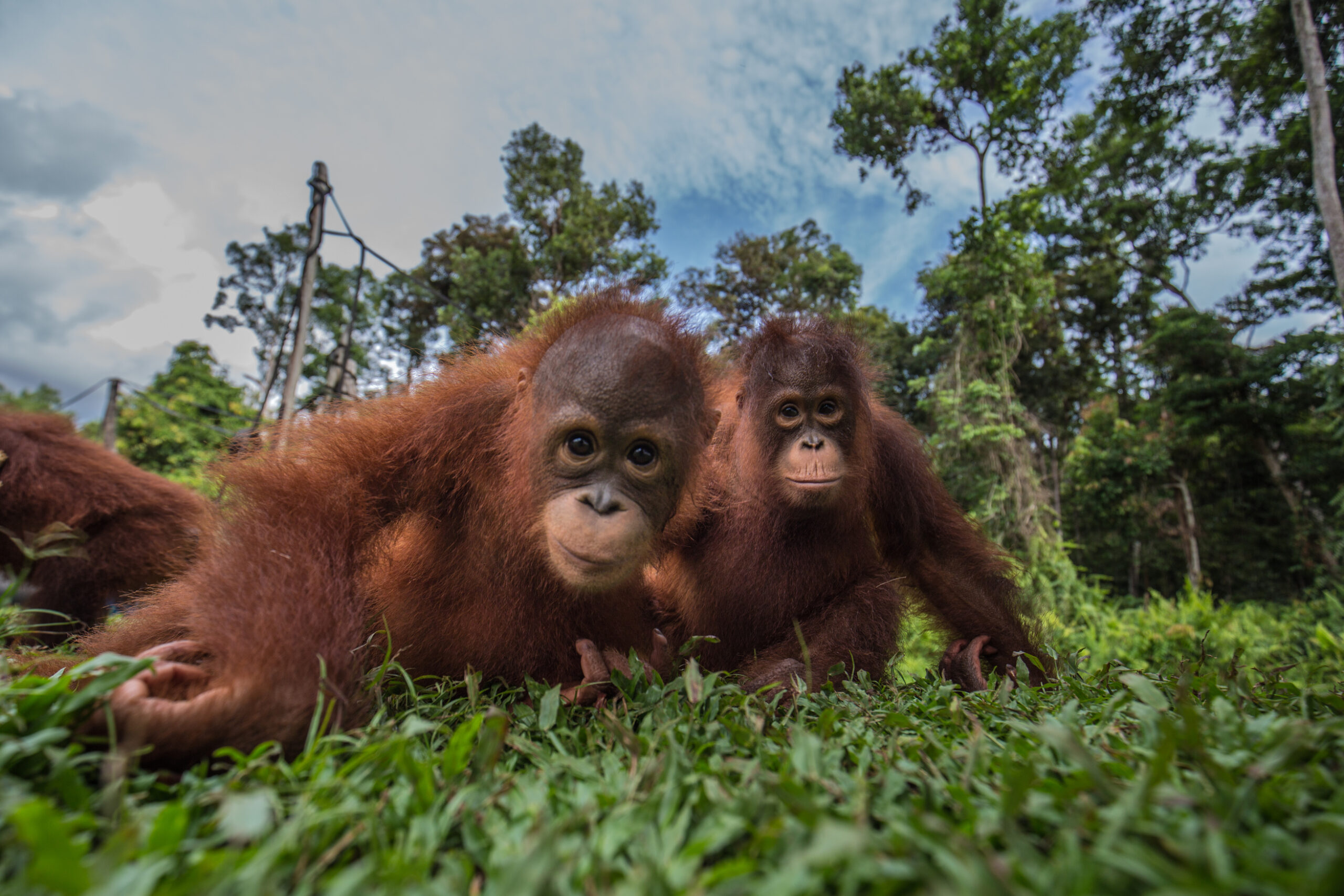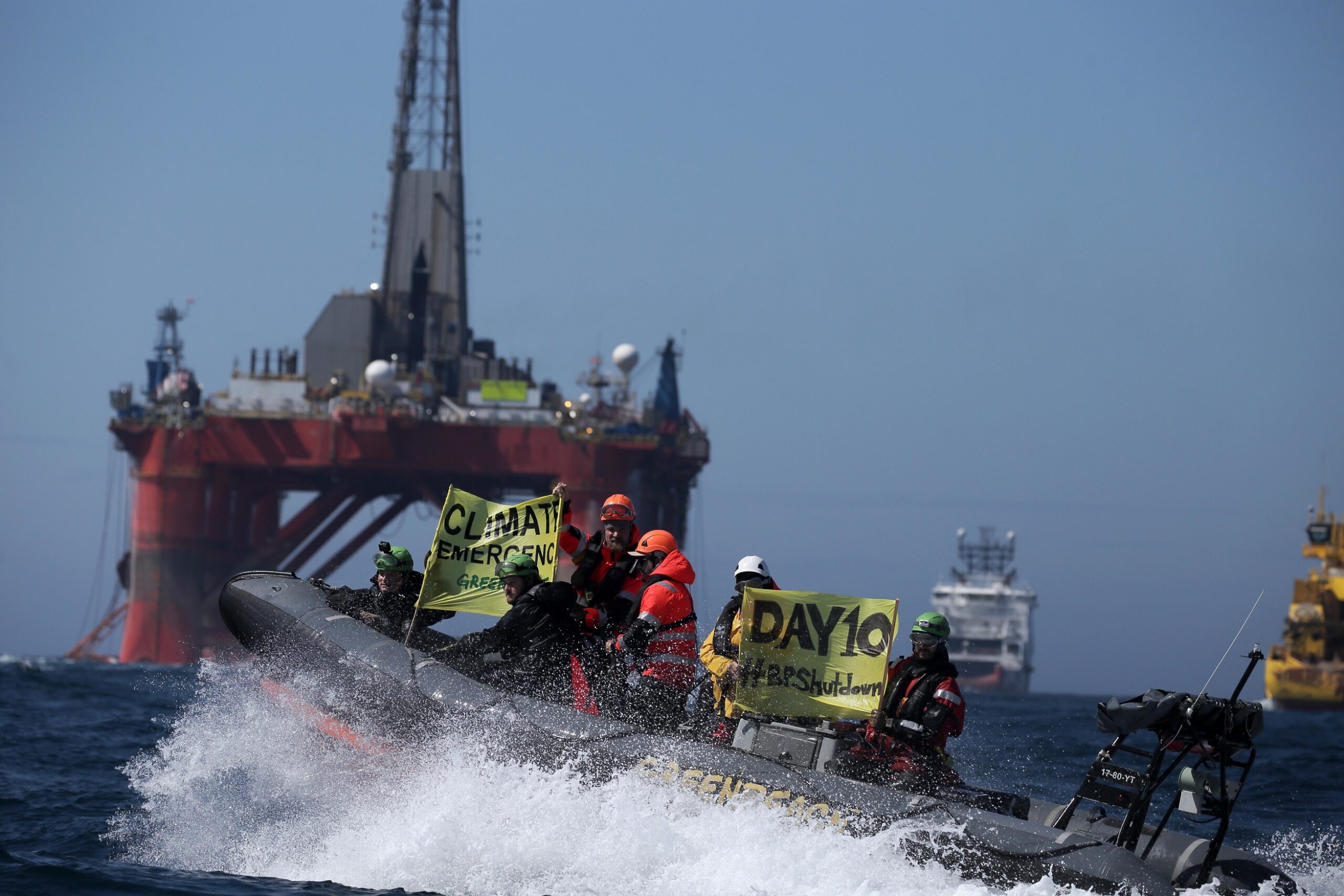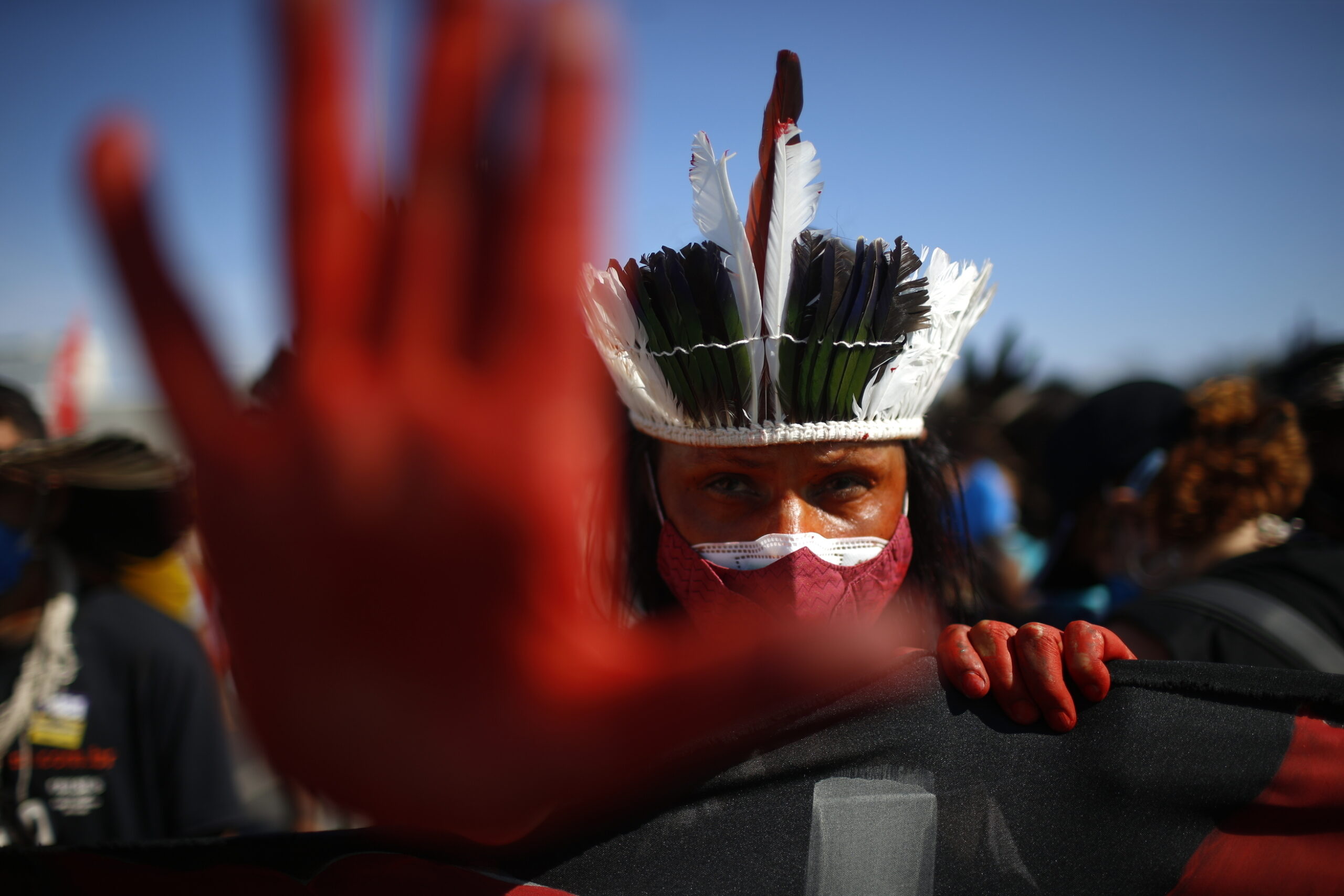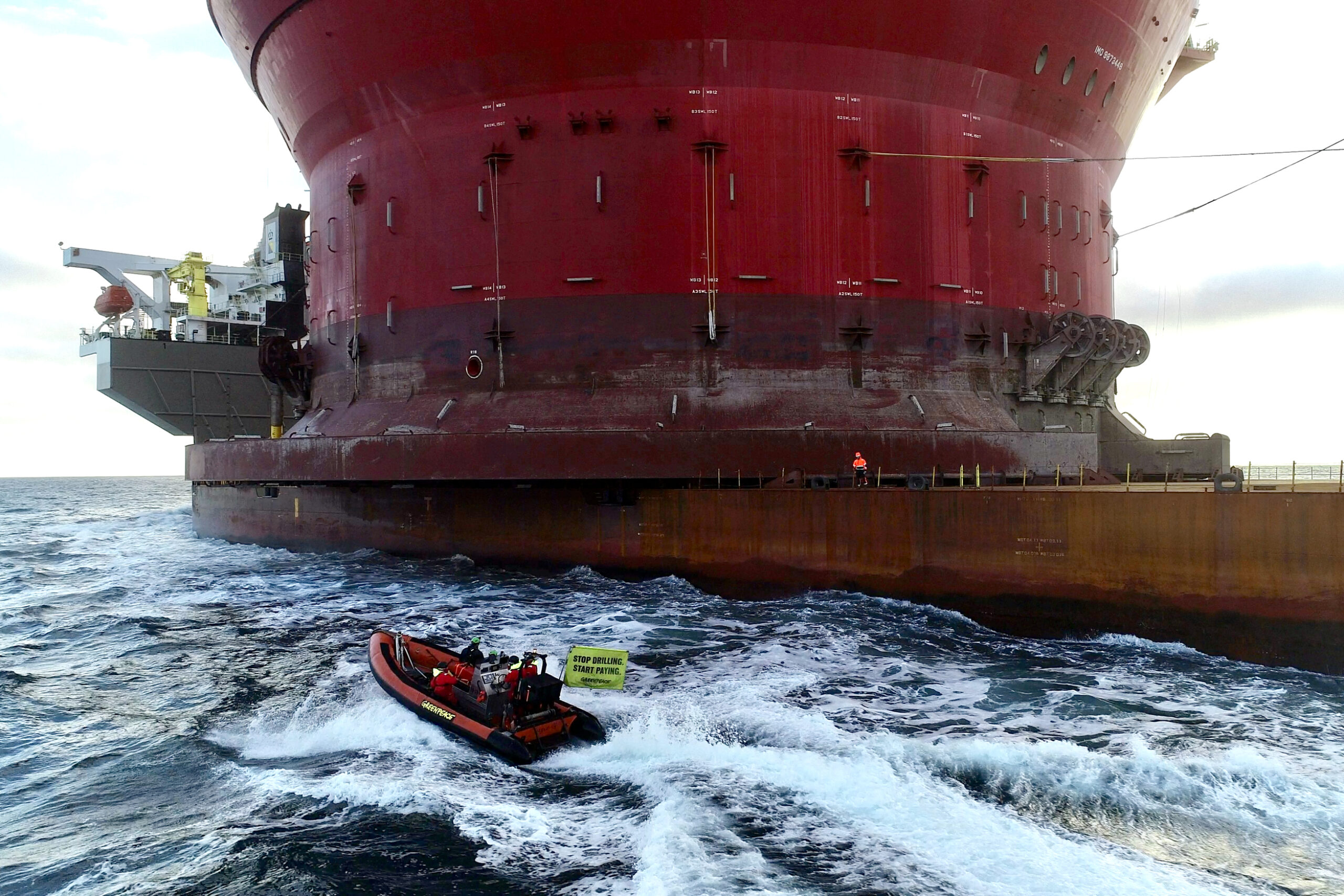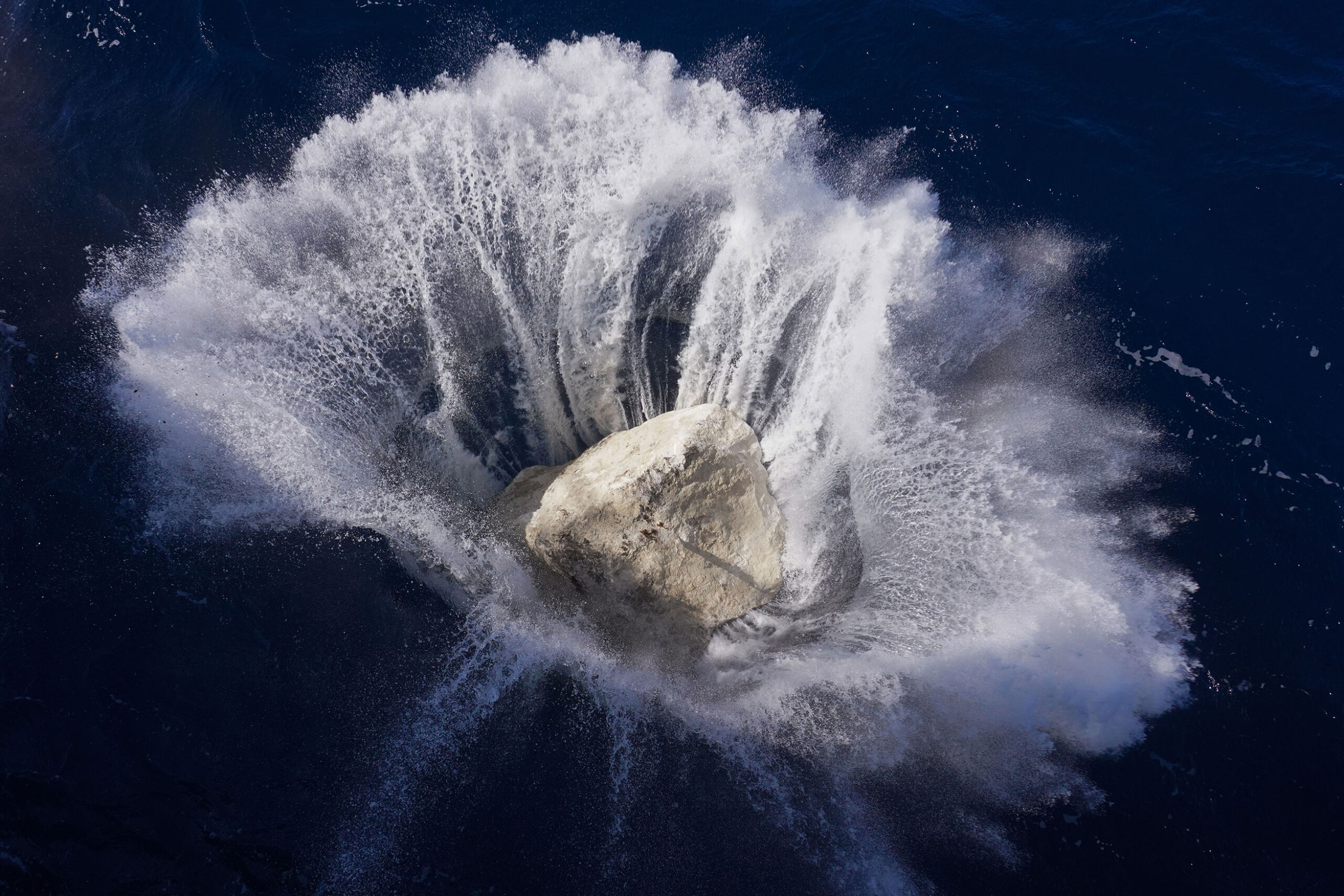
Impact report 2020
Greenpeace impact reports
How to begin a review of Greenpeace’s impact in 2020? It was a challenging year, when Covid-19 made the world around us unfamiliar and when so many of us faced great sadness and uncertainty.
And yet, even in the midst of a global pandemic, some things remained inspiringly familiar. As we all became more aware than ever of the value of nature – and of the need to protect it – the dedication and determination of the whole Greenpeace community never wavered. If anything, in a year when we were vividly confronted with climate, nature and health emergencies, our staff and supporters responded with unprecedented energy.
It’s true that in one sense 2020 was a year of postponement. Major global summits on our climate, on biodiversity and on ocean protection were delayed until 2021. The focus of the world’s governments was rightly on controlling the pandemic. But the last thing this report suggests is an organisation kicking its heels. From facemask-wearing Greenpeace volunteers targeting forest-destroying supermarkets to our ship crews documenting illegal fishing and taking direct action to stop it, we never stood still. As the months passed, hundreds of thousands of people joined our campaigns to protect our forests and oceans and to build a green, safe and peaceful future after the pandemic.
One devastating truth did become painfully clear, of course: we urgently need to transform our relationship with the natural world or risk entering an era of pandemics. But by the end of the year we had witnessed signs of how profound change is possible. BP had pledged to slash its production of climate changing fossil fuels and increase its investment in renewable energy. The UK had announced a ban on all new petrol and diesel cars from 2030. We have campaigned on these issues for years, and while the pace of progress is still far from what’s needed, the penny is beginning to drop globally that business as usual really is no longer an option.
We also shifted our resources to have the biggest impact in a rapidly changing context: for example, detailing exactly how a green recovery should look. Protections for our nature, land and seas must be integral to that recovery. We forget that the UK is one of the most nature-depleted countries in the world.
Another of our main concerns as the pandemic began to spread was of course the wellbeing of our staff. We took rapid action to give people effective support to work remotely and to stay well. And in the summer, the murder of George Floyd and the subsequent Black Lives Matter protests also led us to confront our own role in dismantling systemic racism. We are committed to achieving stronger representation of people of colour across our organisation.
Recalling 2020 as whole, we can look back on such a turbulent year and still find reasons for hope. On behalf of everyone at Greenpeace, I would like to thank you enormously for your ongoing support at this time. It is a constant source of inspiration.
John Sauven, Executive Director, Greenpeace UK
Our ships
In 2020 our ships – the Rainbow Warrior, Arctic Sunrise and Esperanza – travelled a total of 47,822 nautical miles around the world. From investigating the threats facing penguin colonies in Antarctica to preventing shipments of crude oil in Sweden, our three ships provide invaluable support to Greenpeace campaigns around the world.
After Covid-19 initially sent all our ships back to port, our ships unit sprang into action to create strict measures and protocols to ensure that all operations were covid-secure. This included personal protective equipment, observing quarantine rules and Covid-19 testing. We feel proud to have been able to continue undertaking crucial science, investigations and peaceful action at sea in 2020.
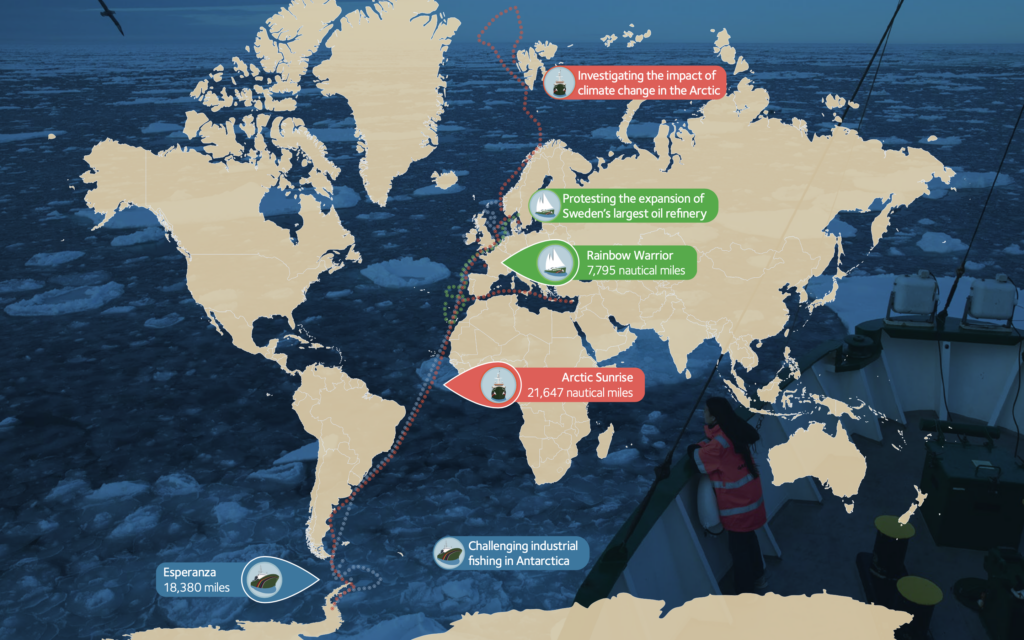
Forests: industrial meat under fire
We made sure the companies frying our rainforests to make way for industrial meat had nowhere to hide, as forests campaigner Anna Jones explains.
Even in a year when a pandemic swept the planet, our forests continued to be torn down at an unimaginable rate. The Amazon fires in 2020 were the worst in over a decade, with vast areas of ancient forest reduced to ash.
Other precious landscapes including the Brazilian Cerrado and the Pantanal – the world’s largest wetland – also saw record fires. And the biggest driver of this destruction? The global meat industry, which has a seemingly insatiable hunger for land. Huge numbers of fires were started deliberately to make way for mega cattle ranches and to grow crops like soya for animal feed. So in 2020, we exposed the links between deforestation and industrial meat, and made sure the companies responsible felt the heat like never before.
In Brazil, we documented the true scale of the crisis engulfing the Amazon and other precious forests. Monitoring the destruction from the air in July – during what was supposed to be a moratorium on forest fires – we took images of miles of the Amazon engulfed in flames, smoke billowing up into the sky.
Galvanised by what we’d seen and by Brazilian President Bolsonaro’s attempts to weaken environmental safeguards in the Amazon during the pandemic, we launched a new forests campaign in the UK in August. And, having commissioned YouGov research that showed how little awareness there is of the links between deforestation and industrial meat, we decided to target the UK supermarket that sells more industrial meat than any other: Tesco.
The store buys meat from two UK companies – Moy Park and Tulip – controlled by JBS, a Brazilian meat packing company and one of the world’s most notorious forest destroyers. Tesco knows this but has chosen to ignore it. We made sure that turning a blind eye was no longer an option.
Our campaign launch report, Still Slaughtering the Amazon, made headlines by exposing the links between JBS and Tesco. At the same time, Greenpeace supporters raced to our forests’ defence. Close to 200,000 signed an online petition calling for Tesco to ditch forest destroyers, while almost 70,000 – a record for Greenpeace in the UK – sent a personal email to outgoing Tesco CEO Dave Lewis. We also sent a powerful message from Indigenous leader Sônia Guajajara direct to Tesco, playing it on a giant screen outside the store’s UK HQ. Her question was simple: “Which side are you on?”
With pressure on Tesco mounting, in October we launched Monster, our latest animation. Made with the Oscar-nominated team at Cartoon Saloon, the short film tells the story of a boy’s unlikely friendship with a jaguar whose forest home is being destroyed. Narrated by Brazilian actor Wagner Moura, the film made waves worldwide – including in Brazil. By the end of 2020, Monster had been watched around four million times globally.
As well as massively increasing awareness of this issue, Monster gave our tireless local groups an ideal way to highlight Tesco’s links to forest destroyers. Groups visited over 300 shops, using cut outs and puppets from Monster to create a buzz on social media, and attaching giant forest fire stickers to store windows. We also sent a life-size animatronic jaguar to prowl outside Tesco stores, and projected a giant jaguar, along with the slogan, ‘Every little harms’ onto Tesco’s HQ.
The impact? Clearly feeling the heat from this wide range of campaign tactics, Tesco responded. It set a target to increase sales of plant-based alternatives to meat by 300%. This is a start, but it’s no more than that. Industrial meat is frying our forests, and until Tesco cuts all ties with JBS, it’s effectively bankrolling the destruction of the Amazon and other forests on a massive scale.
Later in the year, a joint investigation by our Unearthed journalists, the Bureau of Investigative Journalism, the Guardian and ITV News made the 10 O’Clock News after finding that Tesco, Asda, Lidl, Nando’s and McDonald’s all source chicken that’s fed on soya linked to deforestation and fires in Brazil’s threatened Cerrado savannah. We won’t stop pushing for change until all these companies take bold and decisive action.
As part of our ongoing work in solidarity with Indigenous communities in the Amazon, we also helped deliver 28 tonnes of emergency supplies to remote forest areas as the coronavirus pandemic struck. The lack of government support and the limited availability of healthcare among Indigenous communities, combined with the presence of miners and loggers continuing to illegally cut down forests in Indigenous lands, was having a devastating impact. So we worked with a range of partners to deliver oxygen cylinders, coronavirus tests, hand sanitiser and 24,700 facemasks made by Greenpeace supporters.
It’s one more example of the work you made possible last year to protect the future of our forests. Scientists now believe that unless deforestation is halted, within 20 years the Amazon will no longer generate enough rain to sustain itself. Many other forests are being pushed to the brink. Unless we stop destroying our forests and producing industrial meat, we also make ourselves far more vulnerable to pandemics. But, driven forward by your support, we’ll do everything in our power to make sure our forests are safe for many generations to come.
Oceans: the power of wide-ranging action
We began 2020 surveying penguin populations in Antarctica and ended it creating an underwater barrier to protect UK seas. As ocean campaigner Will McCallum recalls, in the face of growing threats to our oceans, we took action from every angle.
Part of Greenpeace’s power lies in our multifaceted approach. Take the moment in September when we began placing boulders on the seabed of Dogger Bank, 100km off England’s east coast. It was a peaceful direct action, reliant on years of marine experience, based on careful evidence gathering and backed up by direct political lobbying and massive pressure from the wider Greenpeace community. Within days, the Government responded.
Dogger Bank is a Marine Protected Area (MPA), but the UK government has continued to allow destructive industrial bottom trawling along the seafloor. In June, we witnessed the damage being done by scallop dredgers ploughing up the sea bed. Shortly afterwards, we published research showing that giant industrial supertrawlers had spent almost 3,000 hours fishing in UK MPAs in 2019, threatening the livelihoods of our small scale fishing communities.
This inspired 350,000 Greenpeace supporters to sign our petition calling on the government to ban supertrawlers and destructive fishing from MPAs. When ministers failed to respond, we provided protection ourselves, safely using natural granite boulders to prevent bottom trawlers fishing in 47 square miles of Dogger Bank. In early 2021 the government pledged to ban bottom trawling at Dogger Bank. Diverse action gets results.
The year had begun with two journeys. On the final stage of our groundbreaking Pole to Pole expedition, scientists joined us to survey the chinstrap penguin population in Antarctica. They discovered penguin numbers have dropped 60% since 1971. This devastating story got worldwide media coverage. We also witnessed and raised the alarm about transhipment, when fish are moved from one vessel to another at sea. Transhipment enables illegal and unregulated fishing and puts worker’s rights at risk – and we highlighted this little-known threat in new research.
The other journey was very different but no less effective. Created by the Oscar-winning team at Aardman Animations and voiced by a cast including Jim Carter, Olivia Colman, David Harbour and Helen Mirren, our short film Turtle Journey showed how climate change, plastic pollution, oil drilling and overfishing are pushing turtle populations to the brink. It’s been watched seven million times globally, bringing a huge audience to our work and picking up a slew of awards in the process.
Then in September we journeyed to the Arctic. As scientists on board studied biodiversity in the region, climate activist Mya-Rose Craig staged the world’s most northerly climate strike. Together with youth activists from across the globe, she called on leaders at the UN Biodiversity Summit to act now to protect our oceans.
Finally, we ended the year by following up our 2019 work on deep sea mining. Our latest research exposed how private companies are lobbying governments to carve up the seabed for profits. Whenever our oceans are at risk, we respond.
Climate emergency: relentless pressure, signs of change
As the coronavirus pandemic made the green recovery headline news, we showed companies and governments exactly how a safe, just and peaceful future must look. Climate campaigner Mel Evans details a momentous year.
It’s tempting to see 2020 as having two distinct parts: the early months, before the coronavirus began to spread worldwide, and the subsequent period, when the world faced up to the pandemic and began to come to terms with its impact. But while our campaigning methods inevitably changed throughout the year, our guiding principle stayed the same: there is still time to limit global heating and seize a better future, as long as we bring an end to business as usual.
In February and March, we made that clear to two companies at the heart of the climate emergency: Barclays and BP. Barclays is the biggest funder of fossil fuels of any European bank, and BP had just announced plans to spend $71 billion digging up new oil and gas. Our response? In a coordinated action that stretched from Portsmouth to Dundee, Greenpeace supporters peacefully closed down nearly 100 Barclays’ branches. And on BP CEO Bernard Looney’s first day in the job, 100 volunteers welcomed him by shutting down the company’s London HQ and demanding it stopped drilling for new oil and gas. To make sure Looney got the message, 10,000 of our supporters also tweeted BP demanding action.
We’ve been campaigning against BP for decades, and the aftermath of a previous direct action not only continued into 2020 but also showed the incredible dedication of our supporters. BP’s rig operator Transocean had taken legal action against us after Greenpeace activists blocked a BP rig from drilling new oil wells in the North Sea for 12 days in 2019. Our executive director John Sauven faced up to two years in prison as a result, but his response was clear: “We will not be silenced”. We were deeply disappointed to be fined £80,000 for this action, but the response from supporters was truly inspiring. Within days, we received enough in donations to pay the fine. That’s what community action looks like.
In May, after the pandemic had redefined our daily reality, we joined with 70 NGOs and businesses to write to the Prime Minister with high-level demands for a more resilient future. Then in June we got down to the detail in our own manifesto – A Green Recovery: How We Get There. Boris Johnson had pledged to “base our recovery on solid foundations, including a fairer, greener and more resilient global economy,” but had failed to give details of what this would involve. So we created this detailed, ready-made roadmap, showing how to transform the way we live, travel and work after the pandemic. Clean transport, green energy, smart power and the restoration of nature were key priorities.
To make sure these demands couldn’t be ignored, we secured widespread media coverage of the manifesto and staged a socially distanced protest in Westminster, changing road signs surrounding parliament to show all roads leading to a green recovery. We joined with sustainability advisers 3KEEL to publish a report showing that a green economic recovery package could create 1.8 million new green jobs. And we worked with Transport & Environment and Carbon Watch to monitor bailouts for polluting sectors. Over 167,000 people signed our open letter to Chancellor Rishi Sunak calling for conditions on airline bailouts to help tackle the climate emergency, which we delivered to him in Westminster on a giant paper plane.
The need for jobs to be safeguarded was also at the heart of our report Offshore, published in October. Based on a survey we conducted with Friends of the Earth Scotland and Platform, it featured oil and gas workers’ views on conditions in their industries and on the need to shift to clean energy. The survey showed that morale is low but that workers are willing to retrain and move into new sectors. Moving forward, we will continue to lobby for a just, genuinely worker-led transition away from fossil fuels.
Finally, no review of our climate work in 2020 would be complete without mention of some truly significant announcements. In August, BP pledged to cut oil and gas production by 40% by 2030 and generate 20 times more renewable energy by the same deadline. That’s the same BP that in 2019 announced plans to spend tens of billions of dollars on fossil fuels. Every Greenpeace supporter who has been part of our relentless campaigning against BP in recent decades should feel proud of their part in this decision.
Similarly, in November, the UK government announced plans to ban sales of new petrol and diesel cars by 2030 – ten years earlier than previously planned. This came hot on the heels of a promise to power every home in the UK with offshore wind energy within a decade. And while all of these promises still need to be fleshed out and made real, it’s hard to ignore the sense that change is finally in the air. Progress that Greenpeace supporters have demanded for years is beginning to take shape. That’s the power of persistence.
Unearthed: revealing the stories that sparked progress
Time and again in 2020, Unearthed journalists exposed truths that companies and governments wanted to keep hidden – and the benefits for our planet were immediate. Unearthed Editor Damian Kahya explains more.
In a year when the news agenda moved faster than ever, many of our investigations had lasting impact. Working with Greenpeace colleagues in the US and Africa, over the summer we revealed that a lobby group representing some of the world’s largest oil and gas companies was pushing the Trump administration to use a US-Kenya trade deal to expand the plastic and chemical industry across Africa. Several of those companies – including Shell, Exxon and Total – had founded a $1bn initiative to create a ‘world free of plastic waste’, but they were also lobbying to prevent new limits being placed on the amount of plastic waste that could be exported to developing countries.
The story was featured on the front page of the New York Times, as well as being picked up by African outlets including The Nation and The Star in Kenya. With momentum and alarm growing, 62 Members of the US Congress wrote a public letter to President Trump expressing their concerns, and Kenya’s trade secretary swiftly made a statement saying no such trade deal would be made.
That was by no means the only story to deliver rapid results. In July we worked with The Telegraph and Portico to reveal how countries across Europe were exploiting a legal loophole to keep using bee-killing pesticides, two years after the EU introduced a landmark ban. We followed this in September with a major investigation that showed that thousands of tonnes of pesticides banned for use in the EU were still being shipped from British and European factories to developing countries.
The second story was reported by major news outlets across Europe, from the BBC to Le Monde to La Stampa. Within a month, the European Commission had announced in its new chemicals strategy that it intended to end the export of banned chemicals.
Here in the UK, we reported on everything from the car industry’s attempts to delay new rules on climate emissions to the US meat companies pushing to get low-cost chlorine-washed chicken onto UK shelves. And we were pleased to find out that one of our videos, on the collapse of insect numbers, picked up the prize for Best News Analysis/Explainer at the Association of British Science Writers Awards. We always intend to highlight pressing environmental issues with insight and clarity, and it was gratifying to be recognised for doing just that.
Top stories from Unearthed
Oil companies waste export lobbying in Africa
Major oil and gas companies were found to be using a US-Kenya trade deal to expand the plastic and chemical industry across Africa, and lobbying against limits on waste exports to developing countries.
Bee-killing pesticides in Europe
European countries were found to be exploiting a legal loophole to keep selling bee-killing pesticides, despite an EU ban on their use. Factories were still sending the pesticides to developing countries.
Chlorine-washed chicken in a US–UK trade deal
Trump’s team for negotiating a post-Brexit US–UK trade deal was being lobbied by US meat companies pushing to get low-cost chlorine-washed chicken onto UK shelves.
Anti-racism commitments
The murder of George Floyd and the subsequent Black Lives Matter protests led us to confront our own role in dismantling systemic racism. Greenpeace UK’s Diversity & Inclusion and Anti-Racism Lead Meena Rajput explains more.
As an organisation and as individuals, we at Greenpeace UK are committed to dismantling systemic racism, creating a community of allies and empowering people of colour. Although we have started the journey of tackling systemic racism, there is much more we can and will do.
We will do this to demonstrate solidarity with those fighting systemic racism. But we will also do this because we recognise that systemic racism is directly linked to climate change and environmental abuse. The mainstream environmental movement has been too slow to expose this link.
Greenpeace already works to support people who are underrepresented across our movement and society, including our equity and empowerment programme for people of colour at Greenpeace, funding positions for people of colour on the Campaign Bootcamp training programme, running our own activist trainings and offering our warehouse space and equipment to activist groups – and of course we must do more.
Our anti-racism commitment
In 2020, we made four commitments to improve the way we work on these issues.
- We recognise that black voices are underrepresented across our sector, in particular in leadership positions. We commit to proactively achieving stronger representation of black people and people of colour across both the wider sector and our own organisation – in particular within leadership positions.
- As an actions led campaigning organisation we will become strong allies of the anti-racism movement and explicitly expose the links between systemic racism and environmental abuse.
- We will organise ongoing anti-racism education programmes for all staff in order to embed a culture of anti-racism into the fabric of our organisation.
- We will continue to review this work to hold ourselves to account and be better.
If you are a people of colour led climate justice group and would like to explore how Greenpeace could support or work alongside you please email me at meena.rajput@greenpeace.org.
Global impact
Stories from around the world
Sweden
Greenpeace Sweden prevented the expansion of Sweden’s biggest oil refinery, which would have released an additional one million tonnes of CO2 into the atmosphere every year. Two weeks after activists onboard Greenpeace ship Rainbow Warrior peacefully blocked oil tankers destined for Preem’s oil refinery for over 60 hours, Preem withdrew its application to expand, representing a huge win for our planet.
Brazil
After three years of constant pressure, oil giant Total abandoned its drilling projects near the pristine Amazon Reef. Total was denied the licence to drill in 2018, but the company took advantage of Brazilian President Bolsonaro’s anti-environment agenda to restart the project. Scientists onboard the Greenpeace ship Esperanza then discovered the region was a whale breeding ground. And, as a result, more than two million people signed our petition, helping us win this huge victory for traditional communities, ocean wildlife and the climate.
Senegal
Following campaigning by artisanal fishermen and female fish processors supported by Greenpeace Africa, the Senegalese government rejected the licensing requests of all 52 new foreign industrial fishing vessels. This was a massive win for the ocean, food security in West Africa and for the fishing communities that have been fighting for a long time to get their government to support small-scale fishers over industrial giants. Senegal also joined the UK-led initiative to protect 30% of global oceans by 2030.
South Korea
Since 2019, Greenpeace Seoul has called on the country’s government to declare a climate emergency and commit to net-zero emissions by 2050. In March, South Korea became the first Asian country to announce a climate manifesto: the Korean Green New Deal. The manifesto included policies to end coal project financing and introduce a carbon tax on polluters. The National Assembly then declared a climate emergency and the government pledged to become carbon neutral by 2050.
New Zealand
A monumental victory was won for New Zealand’s oceans as the country’s Court of Appeal upheld the decision to deny a massive mine on the South Taranaki Bight seafloor. Following a six-year legal battle – and relentless campaigning by the Iwi community, Greenpeace and others to stop the mining of the seabed – the judgement described the environment as ‘a bottom line’ that could not be compromised to permit these activities. This sets an incredible precedent for the future.
Mexico
A judge granted a definitive suspension against the Mexican government’s energy policy of burning more fossil fuels by blocking renewable energy projects, after a legal case bought by Greenpeace Mexico. The case was strengthened by working together with environmental groups, human rights organisations and local communities affected by fossil fuel infrastructure. This was a huge step forward towards a fossil fuel-free future for Mexico.
Russia
The Russian government finally responded to years of Greenpeace campaigning and reversed a bizarre law that made it illegal for landowners to plant forests on their agricultural land. Allowing forestry on agricultural lands significantly reduces the pressure for timber on wild forests and makes it possible to employ up to 100,000 people in forestry work – comparable to the number of employees at the country’s largest oil company, Rosneft. This shift increases the chances of a bright future for the Russian people that doesn’t depend on oil.
United States
After over a year of engaging with the US Department of Labor on forced labour in Taiwan’s distant-water fishing fleet, the government announced that fish harvested by these vessels would be labelled as Goods Produced by Forced Labor. US Customs also blocked all seafood imports from two vessels investigated by Greenpeace SE Asia. These are significant steps forward in global efforts to end forced labour, illegal fishing and overfishing on the high seas.
Funding our mission
Your unwavering support inspired us throughout 2020 says Shabby Amini, Greenpeace UK board member.
I have never felt so grateful for the unwavering commitment of our supporters. Just as we were preparing some of our biggest and boldest plans for the start of the ‘Decade of Change’, we were faced with Covid-19 and the resulting closure of our face-to-face fundraising programme and cancellation of Glastonbury. We don’t keep large financial reserves so there was every reason to fear for the impact we could make, knowing that 2020 would be a tough year for everyone. But we soon saw that people were still fully with us, maybe even more so, as we experienced first hand the fragility of our ‘normal’ way of living, and reconnected with the power of the natural world. Thanks to the loyalty of our supporters old and new, and the determination and ingenuity of our amazing fundraising team, we raised even more than we expected and spent it as effectively as ever on delivering our environmental mission. Thank you.
Where our money came from
What we spent it on
These are the combined accounts of Greenpeace UK Ltd and Greenpeace Environmental Trust, which funds the promotion of sustainable development, scientific research, investigations and educational projects that further our understanding of the effects of human activity on the natural environment. If you would like to enquire about making a charitable gift to Greenpeace through a Foundation or Trust, please contact Louise Krzan on 020 7865 8175.
Case study: Greenpeace Speakers
Greenpeace’s power has always been in ordinary people empowered to do extraordinary things. And in the wake of the youth climate movement that sparked a sea change in public awareness around protecting our planet, people wanted to know how they could be part of the solution. This is where our 2020 Greenpeace Speakers programme came in.
Thanks to funding raised by the players of People’s Postcode Lottery, we were able to recruit and train a diverse new network of Speakers, including 24 young people, to speak at businesses, schools and youth clubs about all Greenpeace’s campaigns to protect the planet. The aim is to create and foster a new generation of people across the UK who feel inspired to take action in their daily lives and spread the word to protect our planet.
Despite the challenges of Covid-19 meaning speakers couldn’t deliver talks face to face, our Greenpeace Speakers jumped straight into action, innovating and making the most of the online world. Not only did they develop their online talks via Zoom, but they also developed video content for schools, podcasts and radio programmes to help us reach new and diverse audiences.
Tens of thousands of people across Great Britain have been inspired and empowered to take action by our Greenpeace Speakers. From junior school students recording a video message to their local MP in Essex and local tree planting projects in Stirling to students in London persuading the Head Teacher to have meat-free days in their canteen: a new movement of people have joined our efforts to protect the world’s oceans and forests and the fight against climate change.
This project was made possible thanks to funding raised by players of People’s Postcode Lottery
A special thank you
We can’t thank you enough for your support. As the pressures on our planet keep on growing, your support makes all of the progress in this report possible.
We would like to acknowledge the following individuals and organisations for their generous contributions in 2020:
| Adam Balon and family | Alerce Trust | Alex Dale |
| Anne Hess | Becht Family Charitable Trust | Birthday House Trust |
| Brian Gaze and Family | Britta & Jeremy Lloyd & family | Bryony Dahl |
| Changing Ideas | Charities Aid Foundation | Chris & Jane Oglesby |
| Clare Milne | Dale Vince | Emily Feldberg and Elizabeth Atkinson |
| Emma Crook | Fondation VRM | Geraldine Harmsworth |
| Gideon Israel | Greg & Sam Nasmyth | Henocq Law Trust |
| James McGrane | Jamma International | JMG Foundation |
| John Peck and Bindy Saywood | Jorge & Lindsey Villon – Grace Fund | Joseph O’Brien |
| Julia Davies – We have the POWER | Keith Clarke CBE | König Family |
| Levine Family Foundation | Martin & Åsa Hintze | Matthew & Audrey Lawfield |
| Mick Braddick | Moondance Foundation | Nigel & Patricia Dewar Gibb |
| Paul Goodenough | Paul Strasburger | People’s Postcode Lottery |
| Peter Rigg | Peter Staples | Philip Breeze Will Trust |
| Reed Family Foundation | Richard Coates | Ridgeback Trust |
| Rob Button | Rod & Diane Wood | Roger de Freitas |
| Roger Ross & all at Lots Road | Ronald Mitchell | Simon Franks |
| Sir Quentin Blake | Stephen Brenninkmeijer | Susie Hewson |
| Sustainable Markets Foundation | The Adlard Family Charitable Trust | The Esmee Fairbairn Foundation |
| The Frederick Mulder Foundation | The Laura Kinsella Foundation | The Lister Charitable Trust |
| The Peter Smith Charitable Trust for Nature | The Roddick Foundation | The Rowlands Scott Charitable Trust |
| The Underwood Trust | The Waterloo Foundation | The Wright Family Foundation |
| Thirty Percy | Tim Yetman & Catherine Bryan | Tinsley Charitable Trust |
| Tony Duburcq and The Green Trust | Uta Proud | Val Carlill |
| William Chalmers | William Scragg | |
A powerful legacy
Every year we are honoured to receive gifts from supporters who include Greenpeace in their Will. We would like to pay tribute to the compassion and generosity of the following people:
| Susan Margaret Bramley | Maureen Josephine Ivis | Enyd Barron |
| Norman Augustus Cramp | Gabrielle Rowley | Peter Maurice Monks |
| Margaret Helen Smith | Anthony John Patrick Garvey | Peter Frederick Williams |
| Rosemary Georgina Brown | Derek Robert Gould | Walter Hubert Ernest |
| Naomi Wright | Billie Kathleen Good | Lorna Lilian Smith |
| Bernard Paul Rainbow | Peter M Falconer | Anne Rees |
| Fiona Margaret MacPherson Finlayson | Brent George Harrison | Frances Rebecca Breakspear |
| Barbara Honeybourne | Gaenor Price | Jan Virginia Rennison |
| Martin Charles Andrewes Wintle | Clare Lawson | John Read Askew |
| Lynda Mary Ceresole Bruce | Vera Irene Higginson | Anne Rees |
| Mary Irene Hartland | Leslie Pope | Dylys Mary Williams |
| Ann Hannah Makey | John Paul Carmel Dominic Said | June Ilsley Duckworth |
| Brian Edward Keeler | John Reginald Smith Wright | Sonia Yardley |
| Plus 75 others |
